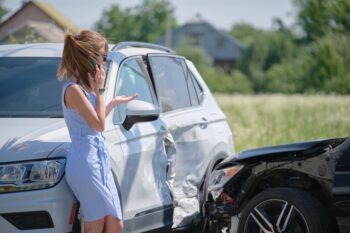
If you were at fault in a car accident, you should notify the police, seek medical care, and get help from an attorney if you believe you’re at fault for a car accident in Florida. You may have legal options even if you initially believe you caused a collision.
A Miramar Beach car accident lawyer can discuss your situation and may investigate to determine if you actually caused a collision. An attorney may also provide information about your options to secure compensation regardless of fault for the crash.
Notify the Police if You Cause a Car Accident
The laws in Florida require you to notify the police after any accident that causes injuries, property damage, or death. You should contact the police even if you believe you caused a crash.
If you attempt to leave the accident without notifying law enforcement, you may face hit-and-run accusations.
The members of law enforcement who come out to the accident scene will file an official police report. However, if you are in a car crash, the police officer who investigates your accident does not have the final say about which driver is at fault, so it’s essential that you get legal help even if the police blame you for a crash.
Get Medical Care if You Cause a Motor Vehicle Accident
You should seek medical attention if you sustain injuries in a motor vehicle collision. Getting medical care quickly can establish that the accident caused your injuries, which may help you secure compensation from the insurance company.
You may need treatment for a wide range of injuries, including:
- A concussion or traumatic brain injury (TBI)
- Spinal cord injury (SCI)
- Broken bones
- Burns
- Internal injuries
You may also need to contact emergency services to secure treatment for other people injured in the crash.
Collect Evidence From the Accident Scene
If possible, you should gather evidence from the crash scene, even if you believe you are the at-fault driver. Evidence can better establish precisely what happened and could point to other potentially liable parties.
Depending on your situation, you may:
- Take pictures of your injuries and all involved vehicles
- Write down everything that happened
- Get contact information from eyewitnesses
Your insurance company may ask for some of this information. A Miramar Beach personal injury lawyer may also use this evidence when assessing your situation.
So, what do you do if you were at fault in a car accident? You should notify the police, get medical care, and collect evidence whenever possible.
Contact a Lawyer to Discuss Your Options
The professionals recommend that you contact a lawyer if you believe you caused a car accident. You may have legal options to get compensation for your losses after a crash in Florida in this situation.
An attorney can answer your questions and explain what to do if you were at fault in a car accident.
Talk to Your Insurance Company After a Crash
You should report your crash to your insurance company, even if you think you caused the collision. The other parties involved in the crash may also reach out to your insurance company, and it is important that the company hears from you about what happened.
An Attorney Can Help You Avoid Mistaken Assumptions After a Crash
Your lawyer can provide straightforward information about your legal situation after a crash and clear up any misconceptions that you may experience. For example, an attorney may provide information about:
A Police Officer’s Ability to Determine Fault
A police officer may testify about what he witnessed at the scene of an auto accident, such as skid marks, the placement of the vehicles, the damage to the cars, and other physical evidence. However, the officer’s opinion about who was at fault carries no weight in a civil jury trial.
Furthermore, the officer may not testify about what people involved in the crash said. The court created this rule (auto accident privilege) so people in a collision could speak freely to the investigating officer without fear of negative consequences.
The Number of People Who Can Hold Fault for a Crash
Another mistake people make is assuming only one person can be at fault for a crash.
Florida follows a modified comparative fault rule, which means that the court can divide fault among the parties involved in a crash and that each person involved is responsible for the damages to the extent of their fault.
For instance, if you ran a red light, but another driver wasn’t paying attention and was texting while passing through the intersection, the jury might find both of you at fault. If so, the jury would have to decide what portion of fault was attributable to you and which portion was attributable to the other motorist.
Does Your Insurance Company Have to Cover Your Losses?
Florida’s insurance requirements mean that you may receive compensation from your insurance company if you cause a crash. Our state requires all motorists to carry Personal Injury Protection (PIP) coverage.
PIP coverage from your insurance company may cover 80% of your reasonable and necessary medical expenses. However, the coverage may only cover up to $10,000 worth of your medical bills.
You may purchase additional insurance policies, like collision coverage, before an accident to secure further economic protection in the event of an accident. Your policy limits play a large role in determining how much compensation you can receive.
Does the Insurance Company Cover Your Property Damage?
Auto insurance companies offer policies, like collision coverage, that can cover the costs of repairing your vehicle after an accident. The funds that you receive through the claims process will depend on the policies you purchase before a collision.
Florida also requires you to carry Property Damage Liability (PDL) automobile insurance. PDL insurance covers potential damage to someone else’s property if you cause a car accident.
What Happens to Your Insurance if You Are at Fault for an Accident?
Your insurance rates will likely go up after you file an auto insurance claim, especially if you caused the collision. However, your rates should not go up until after your policy renews.
A car accident attorney can provide more information about how a crash can impact your insurance and provide more advice about what to do if you were at fault in a car accident.
How Does Modified Comparative Negligence Work?
Florida’s laws on modified comparative negligence mean that multiple parties may hold liability for a crash. Individuals in our state can seek compensation if they hold up to 50% responsibility for a collision.
However, if you hold 51% or more responsibility for a crash, you no longer have a chance to secure any compensation for your losses.
How an Attorney Can Help After a Car Accident
An attorney can step in to assist you in the aftermath of a car accident. Your lawyer may:
Identify Any Potentially Liable Parties
A professional law firm can review all the parties that potentially contributed to your accident. Your lawyer may look at the actions of other motorists to see if they played a role in the collision.
Lawyers may also look for signs that a defective vehicle part contributed to your crash, which could impact the distribution of liability for your case.
Attorneys know how fault is determined after a car accident in Florida and can share this information with you.
Gather Evidence
A lawyer may need to collect evidence about the specific causes of an accident. A thorough investigation may help find all at-fault parties. Your lawyer may need to:
- Visit the scene of your car accident
- Speak to eyewitnesses and take their official statements
- Get a copy of the official accident report
- Collect pictures and videos showing the accident
- Work with car accident experts
Getting fast legal representation can make it easier for your attorney to gather all relevant information. In some situations, a lawyer can explain how to prove you are not at fault in a car accident.
A lawyer can also provide more information about what you do if you were at fault in a car accident.
Track Your Losses
You can rely on an experienced attorney to track all the losses you sustain in a car accident, regardless of who causes the collision. Your lawyer may help you secure funds to pay for your:
- Medical expenses
- Cost of repairs for vehicle damage
- Lost wages
- Pain, suffering, and mental anguish
Remember, your percentage of fault for the crash will impact the compensation you qualify to receive, so it’s essential to contact a lawyer quickly to investigate liability for your automobile accident.
A lawyer can explain how much of your injury is your fault.
How Much Do You Pay a Lawyer After an Accident?
The legal fees for your claim will depend on several factors because personal injury law firms handle car accident claims using a contingency fee system. This kind of system means the firm receives a percentage of your final financial award as payment for legal fees.
Typically, attorneys only receive payment for legal fees after the resolution of your claim. You can learn more about the fees for hiring a lawyer by contacting the law firm for a risk-free initial consultation.
While hiring an attorney results in legal fees, getting professional help can improve your chances of securing fair compensation, especially if you believe you partially contributed to the causes of your collision.
How Long Do You Have to File a Claim After a Crash?
You have limited time to seek compensation after a car accident in Florida. The state recently reduced the statute of limitations on personal injury claims, and now you only have two years to move forward with your claim.
Your lawyer can review the facts surrounding your claim and quickly begin the legal process while helping you understand what to do if you were at fault for a car accident. You can rely on a lawyer to help when a car crash isn’t all your fault.
Talk to Us After a Crash in Florida
Are you wondering what to do if you were at fault for a car accident in Florida? You should notify the police, collect evidence, seek medical care, and reach out to our attorneys at Fasig | Brooks to discuss your options. You may have a claim for financial compensation based on Florida’s modified comparative negligence laws.
Some modified comparative negligence situations result in the recoveries of millions of dollars for our clients because of the severity of their injuries and because we were able to establish the comparative fault of the defendant.
The bottom line: If you sustain injuries in an accident, call a qualified personal injury attorney, even if you think the accident was your fault. Almost all personal injury attorneys give free initial consultations, and you might be surprised about your rights. Reach out to us to learn more about your next steps.



